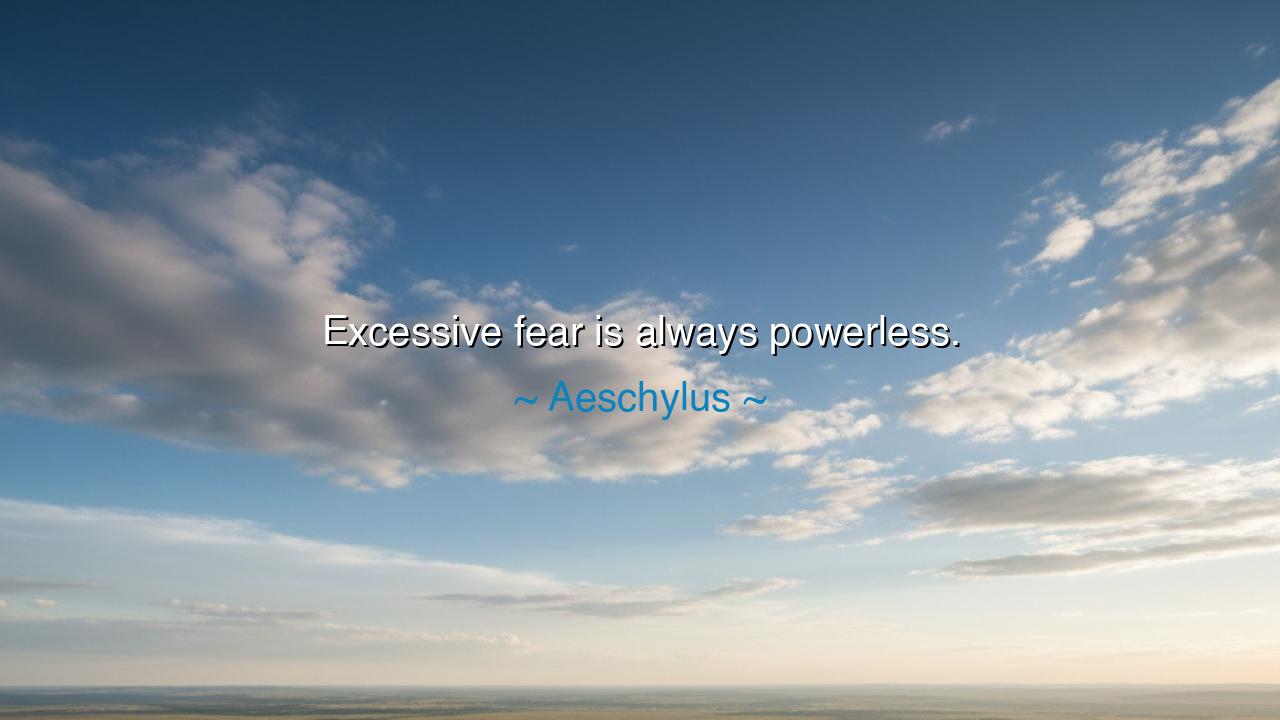
Excessive fear is always powerless.






O Children of the Earth and Sky, listen closely to the wisdom of Aeschylus, the great tragedian, who spoke thus: “Excessive fear is always powerless.” In this simple yet profound utterance, he reveals a truth that transcends the ages—fear, when allowed to grow unchecked, becomes a paralyzing force. It binds the spirit and stills the heart, making the warrior cower and the sage falter. Yet in its excess, fear loses its strength, for it is wisdom and courage that can overcome the greatest of terrors.
When fear rises in the heart, it is like a great storm that clouds the mind, obscuring the path and making the impossible seem insurmountable. But Aeschylus teaches us that fear is not the mighty force it appears to be. When it is allowed to swell beyond measure, it becomes an illusion—an empty threat that robs us of our strength and will. Fear, when it reigns without balance, is nothing more than the shadow of the unknown. The more we surrender to it, the less power we have to act, to move, to change the course of our fate.
Look to the tale of Themistocles, the great leader of Athens, who faced the mighty Persian Empire at the Battle of Salamis. The Greeks were outnumbered, the waters were filled with the enemy's ships, and all seemed lost. Yet Themistocles did not fall victim to excessive fear. In the face of overwhelming odds, he made a bold decision, trusting in the strength of his people and the power of the sea. His courage and clarity of mind turned the tide of the battle, and the Greeks emerged victorious. Had he succumbed to the fear of defeat, his people would have been crushed beneath the weight of it. It was not fear, but resolve, that wielded the power.
And so, O Seekers of Glory, know that fear, in its proper measure, can be a guide—a spark that warns us of danger. But excessive fear, when allowed to grow unchecked, becomes a tyrant, paralyzing the heart and mind. We must acknowledge fear, yet not let it rule us. For courage, the noble child of wisdom and resolve, is always the true conqueror. It is courage that lifts the spirit when all seems lost, courage that faces the storm and walks boldly through the darkness.
In this, let us be reminded that excessive fear serves only to bind us to weakness and doubt. But when we face it with the steady heart of a warrior and the mind of a sage, we shall see it for what it is—nothing more than an illusion that crumbles when confronted by the light of wisdom and action. Cast away your fears, O Children of Light, for in them lies no power. Only in bravery and clarity shall you find your true strength.






Nnguyengialinh
This statement prompts reflection on personal and societal responses to fear. If excessive fear is powerless, it suggests that courage, clarity, and reason are essential for effectiveness. I wonder how individuals can cultivate the ability to act decisively despite fear, especially in unpredictable or dangerous situations. Could education, supportive environments, or deliberate exposure to challenges help people transform fear into productive energy rather than letting it control their choices?
TNTuan Nguyen
I feel intrigued reading this quote because it emphasizes the relationship between emotion and effectiveness. It makes me question why fear often feels so overwhelming, even when rational analysis shows minimal risk. Can mindfulness, preparation, or knowledge mitigate the paralyzing effects of fear, making it a tool rather than a hindrance? What role do personal experiences and cultural narratives play in shaping how fear impacts decision-making and action?
NV23.Phu Nguyen Van
This perspective feels timeless and practical. It highlights that surrendering to fear diminishes our influence and ability to shape outcomes. I wonder how this principle applies to social or political contexts—can widespread fear in a population render communities powerless, and if so, how can leaders or educators counteract it? I’d like insight into the mechanisms by which excessive fear spreads and the ways to foster confidence and informed action.
HNHoai Nguyen
Reading this evokes both concern and curiosity about human psychology. It implies that letting fear dominate can make one ineffective or powerless. I’m curious about the difference between healthy caution and debilitating fear. Are there strategies to cultivate courage and resilience that prevent fear from taking control, while still acknowledging potential risks realistically? How can societies encourage individuals to confront fear without becoming reckless?
TUthai thi to uyen
This quote makes me reflect on the paralyzing effects of fear. It suggests that excessive fear robs individuals of their power to act or think clearly. I wonder how this applies to decision-making in high-stakes environments, like leadership or emergency situations. Can training, mindfulness, or experience help transform fear from a limiting force into a motivating or protective one? How do people learn to balance caution with action?